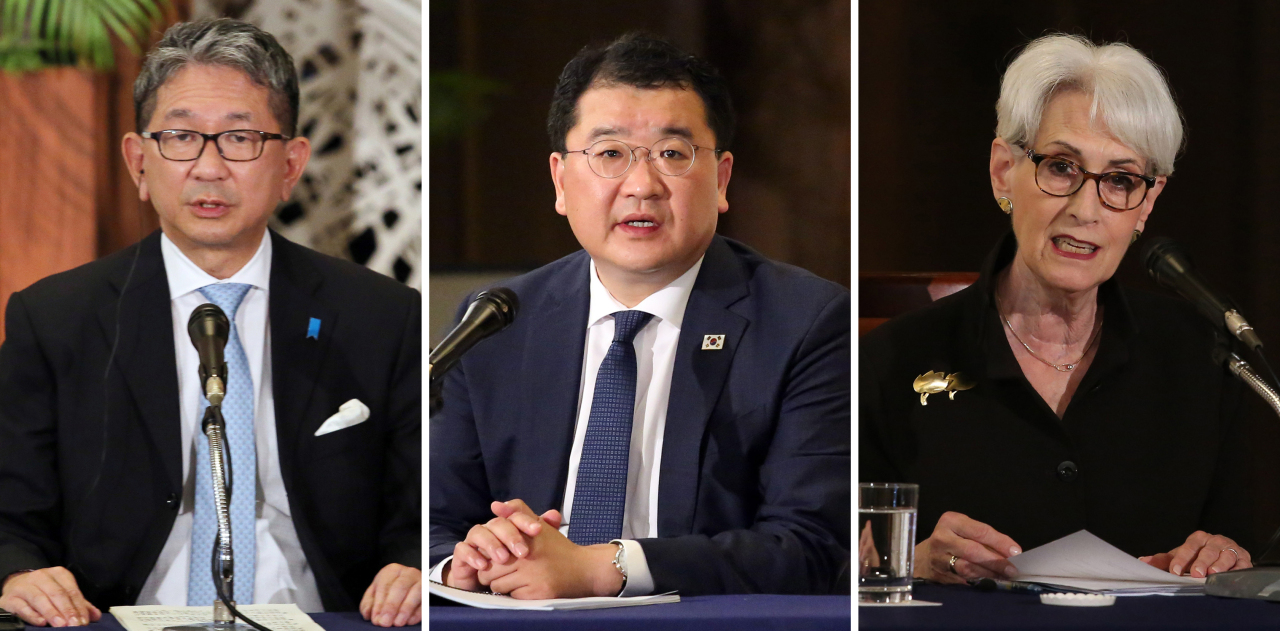South Korean, US and Japanese envoys on Wednesday stressed cooperation in their approach toward the complete denuclearization of the Korean Peninsula, and other global issues, including the COVID-19 pandemic and climate change.
The three-way dialogue between First Vice Foreign Minister Choi Jong-kun and his US and Japanese counterparts, Wendy Sherman and Takeo Mori, respectively, was held in Japan, despite recent flare-up of tension between the two Asian neighbors.
During their talks, the three officials underscored tighter cooperation among the allies in dealing with North Korea’s nuclear problem.
“That close coordination sends a very critical message to North Korea in that we are together and shoulder-to-shoulder in our approach to this policy,” Sherman said during a joint press conference held after the talks with Choi and Mori.
Choi described the denuclearization of the Korean Peninsula as “a long game” which needs strategic coordination between the three countries.
“With Biden administration’s emphasis on diplomacy, North Korea’s response is very important,” said Choi.
Sherman said Washington was “ready” to engage with North Korea.
“The United States has made it clear that we are ready to engage with North Korea. They know that. We hope they will respond positively,” said Sherman. “But as my colleagues have said, we must exercise some patience, perhaps not too much but some.”
She raised hope that the North will understand that a “brighter future” for their country comes from engaging in discussions around denuclearization.
Washington has expressed that it is ready to meet with Pyongyang “anytime and anywhere without preconditions,” but the North has rebuffed US diplomatic overtures since President Joe Biden took office.
During the talks, the envoys also “committed to deepening trilateral cooperation to address the global challenges of the 21st century, including the climate crisis, pandemic response, and economic resilience and recovery,” State Department spokesman Ned Price said in a press release.
The statement said the officials also reiterated opposition to all activities that “undermine, destabilize, or threaten the rules-based international order and affirmed the need to maintain an inclusive, free and open Indo-Pacific region.
The three-way session in Tokyo marks the first vice-ministerial talks to take place between the three countries in four years. Launched in 2015, the trilateral meeting was held in the following two years, but halted during the Donald Trump administration.
The revival of the talks is seen as part of the efforts by the Biden administration to bolster three-way cooperation with its key Asian allies against China’s growing assertiveness and the nuclear-armed North Korea.
Seoul has been seeking to defuse diplomatic tensions with Tokyo, which are rooted in Japan’s 1910-45 colonial rule of the Korean Peninsula and have morphed into an ongoing economic feud.
As part of efforts to mend ties, President Moon Jae-in was seeking to visit Tokyo for the Olympics that may have included his first summit with Prime Minister Yoshihide Suga, but the plan was called off last minute.
In regards to the canceled summit, Choi said that Seoul and Tokyo agreed to continue efforts to address pending issues for a meeting to take place in the future.
He also said the three envoys agreed to hold the trilateral session on a regular basis.
Following the Japan visit, Sherman was to arrive in Seoul Wednesday for a three-day stay. While in Seoul, she will meet officials here and hold a strategic dialogue with Choi on Friday to discuss “bilateral and multilateral cooperation on shared priorities, including the climate crisis, pandemic relief and post-COVID-19 economic recovery,” according to the State Department.
By Ahn Sung-mi (
sahn@heraldcorp.com)








![[Today’s K-pop] Blackpink’s Jennie, Lisa invited to Coachella as solo acts](http://res.heraldm.com/phpwas/restmb_idxmake.php?idx=644&simg=/content/image/2024/11/21/20241121050099_0.jpg)